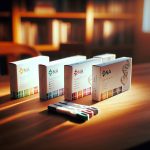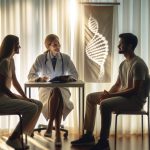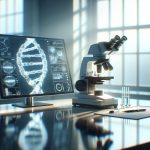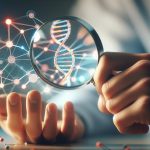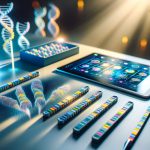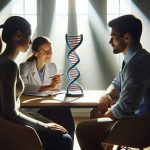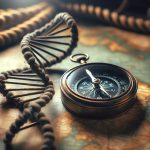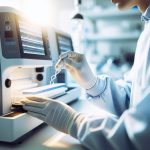Brianne Kirkpatrick embarked on a unique journey in the realm of genetics when she set up Watershed DNA back in 2016. Having already established herself as a skilled genetic counselor within the US, her venture was born out of a desire to provide guidance and support for individuals grappling with their direct-to-consumer (DTC) DNA test results. Over time, Watershed DNA has emerged as a beacon for those seeking clarity amidst the often bewildering world of genetic data.
In her candid conversation, Kirkpatrick sheds light on the complex emotional landscape that accompanies DNA discoveries. It’s not all about tracing lineage or uncovering ancestral secrets; sometimes, these tests unearth truths that can shake one’s very foundation. Recognizing this, she emphasizes the importance of mental preparation before diving into genetic testing.
Kirkpatrick’s insights underscore a universal truth: venturing into your genetic makeup can open Pandora’s box, bringing forth unexpected revelations. Yet with proper guidance and an informed mindset, navigating this terrain becomes less daunting. Her advice is both timely and timeless—arming oneself with knowledge and emotional readiness is key to facing whatever truths might surface.
Describe your project, its inspiration, and its development progress
People often come to me grappling with deep questions about their identity. They’re trying to make sense of new, sometimes surprising information that challenges their understanding of who they are and where they come from. This could be due to a recent medical diagnosis or an unexpected discovery in their ancestry or family lineage. What they’re really seeking is clarity on the emotions stirred by their DNA test results, wondering if what they feel is common or something out of the ordinary.
Clients have various avenues for support through my services. They can work directly with me, join digital support groups—both large and small—attend workshops, engage in private forum discussions exclusive to members, access specialized E-books, and gain insights from podcasts among other resources. My niche in genetic counseling, particularly focused on ancestry and direct-to-consumer tests, sets me apart; it was born out of a personal journey into my own family’s history which had its share of mysteries due to adoptions in past generations.
The revelations that come from DNA testing can be earth-shattering for some—the man they’ve called dad isn’t their biological father or the ethnicity they’ve always identified with doesn’t match their DNA results. These discoveries can send individuals into emotional chaos, leaving them feeling lost.
When I started this venture, there was a glaring gap in support systems for those blindsided by such findings — no easy access to resources or professionals who understood the complex feelings tied to learning you aren’t genetically who you thought you were. Recognizing this need led me to develop various resources myself and link up with existing support networks. Now all these tools are conveniently available through my website.
Writing plays a key role in how I serve the community; not only do I maintain a blog called Watershed DNA but have also co-authored The DNA Guide for Adoptees alongside a genealogist friend. Our book tackles many questions and concerns adoptees might have when turning to DNA testing for answers regarding their family search efforts, identity exploration or medical queries. And there’s more on the horizon—a forthcoming book dedicated specifically to navigating unexpected DNA discoveries promises further insight into this complex topic.
Could you provide a sample?
Imagine a person embarking on what seems like a harmless journey with a 23andMe test, only to uncover facts that drastically alter their understanding of themselves and their health. This happened to an individual who discovered they were half Ashkenazi Jewish, completely unbeknownst to them before the test. Even more shocking was the revelation that they carried a genetic mutation in the BRCA1 gene, significantly hiking up their risks for breast and ovarian cancer.
This kind of news can truly flip someone’s world upside down. Suddenly, you’re faced with questions and doubts you never even considered before. It’s crucial at this juncture that there’s solid support and reliable information readily available because these surprises don’t come with a warning label.
Given the medical implications of her direct-to-consumer (DTC) test results, I suggested she consult with a genetics counselor specializing in cancer. Such professionals can verify results through additional testing and guide on preventive measures against cancer.
The priority is always to rule out any errors – be it sample mix-ups or data misinterpretation. Once we’re confident about the accuracy of these findings, my role shifts towards providing emotional support and guidance on next steps. Finding oneself suddenly navigating through such unexpected waters can feel isolating; however, counseling or therapy might not seem accessible or appealing due to societal stigma.
My job essentially revolves around aiding individuals at different stages of digesting these unforeseen discoveries – identifying where they stand emotionally and practically, offering immediate support, and then figuring out long-term needs including addressing potential health risks or seeking therapeutic help.
In essence, while embarking on genetic testing feels straightforward initially—just spit in a tube—the aftermath could bring profound changes requiring careful navigation through emotions, medical advice, and often challenging family discussions about newly discovered heritage or health predispositions.
Will more research be done to locate the individual’s family members?

When a client discovered their heightened risk for certain health conditions alongside the revelation of an unknown parentage, it opened up a complex journey. Addressing the health risks was one part of the puzzle. The other, perhaps more challenging aspect, was navigating the newfound family ties.
Through remote sessions, we dove into her genetic test results to pinpoint connections to her biological roots. By examining family matches and engaging in thoughtful questioning, we differentiated between maternal and paternal relatives—the latter linked to the father she had yet to meet.
We paid special attention to her most significant DNA match. It’s overwhelming to process such information all at once. So, we paused our investigation to strategize and emotionally prepare for the next steps. Deciding when and how to approach potential biological relatives isn’t easy or immediate; it requires careful consideration of various outcomes.
Understanding that discovering misattributed parentage is a substantial emotional journey is crucial. It’s not something one jumps into without hesitation. Preparing mentally and emotionally for all possible scenarios is vital before taking any action—ensuring that when decisions are made, they are done with care and readiness.
How has DNA testing transformed the study of family history?
DNA testing has revolutionized the way we understand familial connections, breaking away from the traditional reliance on paperwork and hearsay to establish biological relationships. Historically, mysteries like family secrets or adoptions were tucked away, only accessible through shared stories or official documents. However, the advent of DNA testing has shifted the power dynamics. Now, individuals themselves can embark on a journey of self-discovery, tracing their genealogy with a level of precision previously unimaginable.
This scientific advancement is altering long-established narratives within family histories and trees that were once deemed final. The introduction of DNA evidence into genealogical research not just adds layers to our understanding but also redefines it entirely. What was once an unchangeable record can now be questioned and rewritten, offering people new insights into their origins and connections with others.
Through these breakthroughs in genetic science, we’re witnessing an era where uncovering truths about one’s heritage isn’t just reserved for those with access to historical records or inside knowledge. It democratizes history-making itself—allowing everyone the chance to rewrite chapters of their own legacy from a place of informed empowerment rather than speculation.
However, there remains much to learn about DNA
In the vast and intricate world of genetics, our understanding continuously evolves, especially in areas concerning health and ancestry. Presently, scientists are aware of approximately 5,000 genes that have yet to be fully explored. This gap in knowledge means that with each day comes new insights into how our DNA influences our well-being.
When it comes to unraveling the threads of human history and ethnicity through genetics, progress is still ongoing. Many people express curiosity about how ancestry tests can pinpoint their ethnic background. However, they often find that these percentages may shift over time. This variation occurs because testing companies use their unique reference datasets to analyze DNA samples. These datasets are a mix of proprietary information and data shared publicly across the scientific community.
As these databases receive updates and expand, your ancestry report might change accordingly. This fluidity underscores the reality that population genetics does not offer black-and-white answers but rather interpretations rooted in current data. So when comparing results from different companies or noticing changes in your own reports over time, remember that this field is still navigating its way toward precision.
Guidance for beginners interested in exploring their genetic makeup
Before you dive into the process of testing, it’s wise to arm yourself with as much knowledge as possible. Engage in a variety of preparatory activities such as watching informative videos, indulging in relevant literature, and navigating through your chosen test provider’s digital platforms. This groundwork will not only enhance your understanding but also equip you better for what lies ahead.
Upon receiving your results, if they aren’t quite what you were expecting, take a moment to breathe. Hastily drawing conclusions can often lead to unnecessary worry. Remember, there are professionals including genetic counselors and genealogists who specialize in deciphering these outcomes accurately. Seeking their guidance can offer clarity and prevent any misinterpretation of data.
Feeling overwhelmed by surprising findings is perfectly normal. Thankfully, we live in an era where support is readily accessible. A plethora of resources exists – from support groups and counseling services to therapists well-versed in navigating the emotional landscape that accompanies DNA discoveries. With such an expansive network available, facing these revelations solo is no longer a requisite.
In summary, stepping into the realm of genetic testing armed with preliminary research sets a solid foundation for understanding potential outcomes. Should results sway from expectations, professional advice and extensive support systems stand ready to assist in navigating through those revelations efficiently and healthily. Embracing this journey with preparedness and access to help when needed ensures a more informed and less daunting experience.
